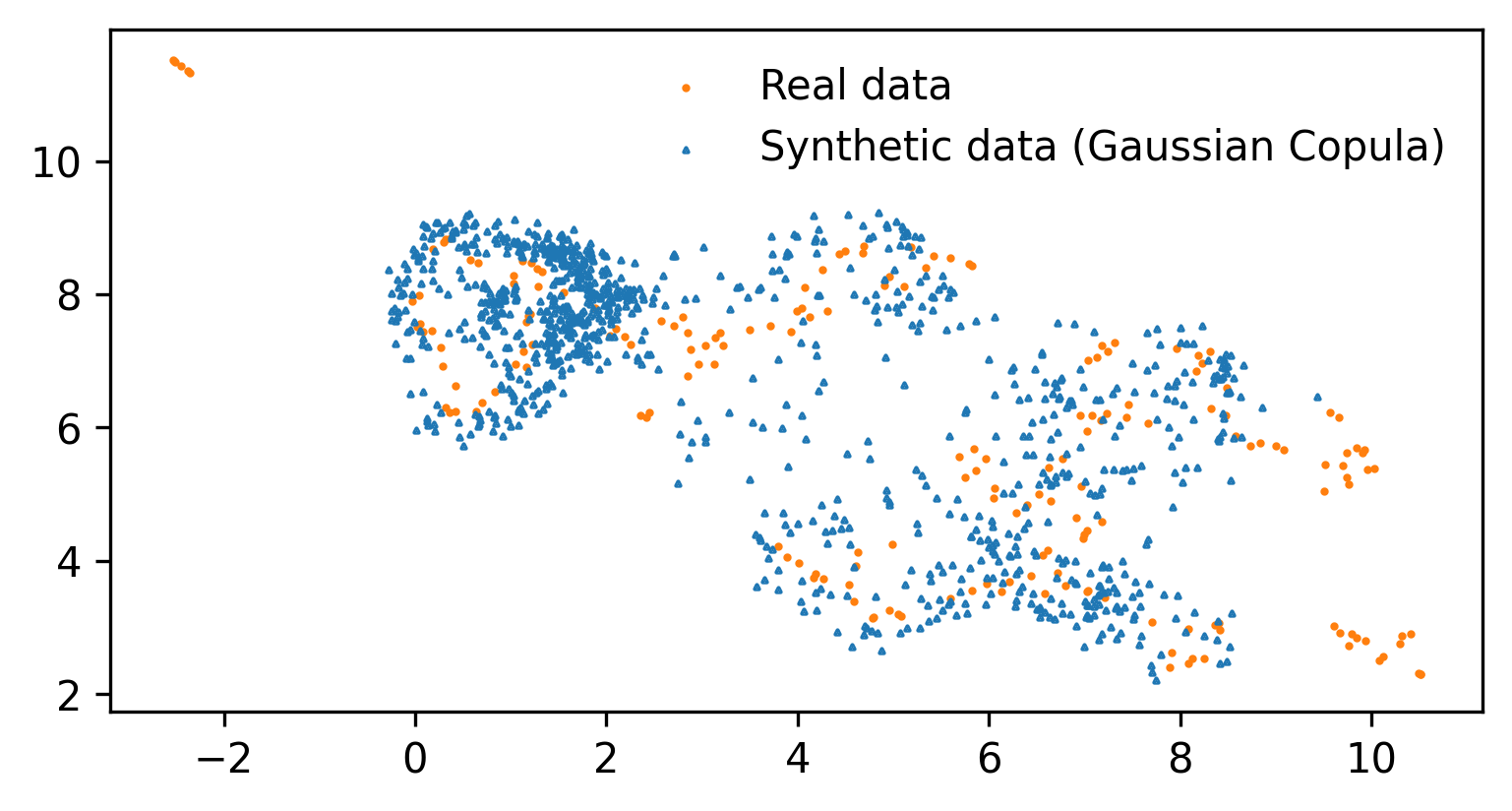Auditing and Generating Synthetic Data with Controllable Trust Trade-offs
2304.10819

0
0
📊
Abstract
Real-world data often exhibits bias, imbalance, and privacy risks. Synthetic datasets have emerged to address these issues. This paradigm relies on generative AI models to generate unbiased, privacy-preserving data while maintaining fidelity to the original data. However, assessing the trustworthiness of synthetic datasets and models is a critical challenge. We introduce a holistic auditing framework that comprehensively evaluates synthetic datasets and AI models. It focuses on preventing bias and discrimination, ensures fidelity to the source data, assesses utility, robustness, and privacy preservation. We demonstrate the framework's effectiveness by auditing various generative models across diverse use cases like education, healthcare, banking, and human resources, spanning different data modalities such as tabular, time-series, vision, and natural language. This holistic assessment is essential for compliance with regulatory safeguards. We introduce a trustworthiness index to rank synthetic datasets based on their safeguards trade-offs. Furthermore, we present a trustworthiness-driven model selection and cross-validation process during training, exemplified with TrustFormers across various data types. This approach allows for controllable trustworthiness trade-offs in synthetic data creation. Our auditing framework fosters collaboration among stakeholders, including data scientists, governance experts, internal reviewers, external certifiers, and regulators. This transparent reporting should become a standard practice to prevent bias, discrimination, and privacy violations, ensuring compliance with policies and providing accountability, safety, and performance guarantees.
Create account to get full access
Overview
- Real-world data often has issues like bias, imbalance, and privacy risks
- Synthetic datasets generated by AI models can help address these problems
- Assessing the trustworthiness of synthetic data and models is a critical challenge
- A holistic auditing framework is introduced to comprehensively evaluate synthetic data and AI models
Plain English Explanation
In the real world, the data we collect and use for various purposes can often be biased, imbalanced, and may raise privacy concerns. To address these issues, researchers have developed a new approach using artificial intelligence (AI) models to generate synthetic data that mimics the original data but without the same problems.
However, determining whether these synthetic datasets and the AI models that created them are trustworthy is a significant challenge. This paper introduces a comprehensive auditing framework that evaluates synthetic data and AI models from multiple angles. It focuses on preventing bias and discrimination, ensuring the synthetic data accurately reflects the original data, assessing the utility and robustness of the data, and protecting privacy.
The researchers demonstrate the effectiveness of this framework by applying it to various generative AI models across different use cases, such as education, healthcare, banking, and human resources. The data types they examine include tabular, time-series, vision, and natural language. This holistic assessment is crucial for complying with regulatory requirements and ensuring the trustworthiness of synthetic data.
Furthermore, the researchers introduce a trustworthiness index to rank synthetic datasets based on how well they balance these different trustworthiness factors. They also present a trustworthiness-driven model selection and cross-validation process during the training of AI models, allowing for greater control over the trustworthiness trade-offs in synthetic data creation.
This approach fosters collaboration among stakeholders, including data scientists, governance experts, internal reviewers, external certifiers, and regulators. The transparent reporting on the trustworthiness of synthetic data should become a standard practice to prevent bias, discrimination, and privacy violations, ensuring compliance with policies and providing accountability, safety, and performance guarantees.
Technical Explanation
The paper introduces a holistic auditing framework for comprehensively evaluating synthetic datasets and AI models used to generate them. The framework focuses on four key aspects:
- Preventing Bias and Discrimination: Assessing the synthetic data for potential biases and discriminatory patterns.
- Fidelity to Source Data: Ensuring the synthetic data accurately reflects the original data distribution and characteristics.
- Utility and Robustness: Evaluating the usefulness and reliability of the synthetic data for various applications.
- Privacy Preservation: Ensuring the synthetic data preserves the privacy of the original data subjects.
The researchers demonstrate the effectiveness of this framework by applying it to various generative AI models, such as TrustFormers, across diverse use cases and data modalities. This includes tabular, time-series, vision, and natural language data from domains like education, healthcare, banking, and human resources.
The key technical contributions of the paper include:
- Trustworthiness Index: A metric to rank synthetic datasets based on their trade-offs between the different trustworthiness factors.
- Trustworthiness-Driven Model Selection and Cross-Validation: A process that incorporates trustworthiness considerations during the training of generative AI models, enabling greater control over the trustworthiness of the synthetic data.
- Collaborative Auditing Framework: A framework that facilitates cooperation among stakeholders, including data scientists, governance experts, internal reviewers, external certifiers, and regulators, to ensure the trustworthiness of synthetic data.
Critical Analysis
The paper presents a comprehensive and well-designed framework for assessing the trustworthiness of synthetic datasets and the AI models used to generate them. The focus on preventing bias, ensuring fidelity to the source data, evaluating utility and robustness, and preserving privacy is crucial for the responsible development and deployment of synthetic data.
However, the paper does not delve into the specific technical details of the auditing process or the algorithms used to measure the different trustworthiness factors. While the high-level framework is outlined, more information on the implementation and validation of the individual components would be helpful for researchers and practitioners interested in applying this approach.
Additionally, the paper could have discussed the potential limitations and challenges of this framework, such as the difficulty of defining and quantifying certain trustworthiness metrics, the computational costs of comprehensive auditing, and the potential for gaming or manipulating the trustworthiness assessment process.
Nonetheless, the introduction of the trustworthiness index and the trustworthiness-driven model selection and cross-validation process are valuable contributions that could help shape the future development of synthetic data generation and its widespread adoption.
Conclusion
This paper presents a holistic auditing framework for comprehensively evaluating the trustworthiness of synthetic datasets and the AI models used to generate them. By focusing on preventing bias and discrimination, ensuring fidelity to the source data, assessing utility and robustness, and preserving privacy, the framework aims to address the critical challenge of trustworthiness in the context of synthetic data.
The demonstration of the framework's effectiveness across diverse use cases and data modalities, along with the introduction of the trustworthiness index and the trustworthiness-driven model selection process, highlights the potential of this approach to foster the responsible development and deployment of synthetic data. This transparent reporting and collaboration among stakeholders should become a standard practice to ensure compliance with policies, provide accountability, and deliver safety and performance guarantees for synthetic data applications.
This summary was produced with help from an AI and may contain inaccuracies - check out the links to read the original source documents!
Related Papers

Advancing Retail Data Science: Comprehensive Evaluation of Synthetic Data
Yu Xia, Chi-Hua Wang, Joshua Mabry, Guang Cheng

0
0
The evaluation of synthetic data generation is crucial, especially in the retail sector where data accuracy is paramount. This paper introduces a comprehensive framework for assessing synthetic retail data, focusing on fidelity, utility, and privacy. Our approach differentiates between continuous and discrete data attributes, providing precise evaluation criteria. Fidelity is measured through stability and generalizability. Stability ensures synthetic data accurately replicates known data distributions, while generalizability confirms its robustness in novel scenarios. Utility is demonstrated through the synthetic data's effectiveness in critical retail tasks such as demand forecasting and dynamic pricing, proving its value in predictive analytics and strategic planning. Privacy is safeguarded using Differential Privacy, ensuring synthetic data maintains a perfect balance between resembling training and holdout datasets without compromising security. Our findings validate that this framework provides reliable and scalable evaluation for synthetic retail data. It ensures high fidelity, utility, and privacy, making it an essential tool for advancing retail data science. This framework meets the evolving needs of the retail industry with precision and confidence, paving the way for future advancements in synthetic data methodologies.
6/21/2024

Best Practices and Lessons Learned on Synthetic Data for Language Models
Ruibo Liu, Jerry Wei, Fangyu Liu, Chenglei Si, Yanzhe Zhang, Jinmeng Rao, Steven Zheng, Daiyi Peng, Diyi Yang, Denny Zhou, Andrew M. Dai

0
0
The success of AI models relies on the availability of large, diverse, and high-quality datasets, which can be challenging to obtain due to data scarcity, privacy concerns, and high costs. Synthetic data has emerged as a promising solution by generating artificial data that mimics real-world patterns. This paper provides an overview of synthetic data research, discussing its applications, challenges, and future directions. We present empirical evidence from prior art to demonstrate its effectiveness and highlight the importance of ensuring its factuality, fidelity, and unbiasedness. We emphasize the need for responsible use of synthetic data to build more powerful, inclusive, and trustworthy language models.
4/12/2024
🏅
Real Risks of Fake Data: Synthetic Data, Diversity-Washing and Consent Circumvention
Cedric Deslandes Whitney, Justin Norman

0
0
Machine learning systems require representations of the real world for training and testing - they require data, and lots of it. Collecting data at scale has logistical and ethical challenges, and synthetic data promises a solution to these challenges. Instead of needing to collect photos of real people's faces to train a facial recognition system, a model creator could create and use photo-realistic, synthetic faces. The comparative ease of generating this synthetic data rather than relying on collecting data has made it a common practice. We present two key risks of using synthetic data in model development. First, we detail the high risk of false confidence when using synthetic data to increase dataset diversity and representation. We base this in the examination of a real world use-case of synthetic data, where synthetic datasets were generated for an evaluation of facial recognition technology. Second, we examine how using synthetic data risks circumventing consent for data usage. We illustrate this by considering the importance of consent to the U.S. Federal Trade Commission's regulation of data collection and affected models. Finally, we discuss how these two risks exemplify how synthetic data complicates existing governance and ethical practice; by decoupling data from those it impacts, synthetic data is prone to consolidating power away those most impacted by algorithmically-mediated harm.
5/6/2024

An evaluation framework for synthetic data generation models
Ioannis E. Livieris, Nikos Alimpertis, George Domalis, Dimitris Tsakalidis

0
0
Nowadays, the use of synthetic data has gained popularity as a cost-efficient strategy for enhancing data augmentation for improving machine learning models performance as well as addressing concerns related to sensitive data privacy. Therefore, the necessity of ensuring quality of generated synthetic data, in terms of accurate representation of real data, consists of primary importance. In this work, we present a new framework for evaluating synthetic data generation models' ability for developing high-quality synthetic data. The proposed approach is able to provide strong statistical and theoretical information about the evaluation framework and the compared models' ranking. Two use case scenarios demonstrate the applicability of the proposed framework for evaluating the ability of synthetic data generation models to generated high quality data. The implementation code can be found in https://github.com/novelcore/synthetic_data_evaluation_framework.
4/16/2024